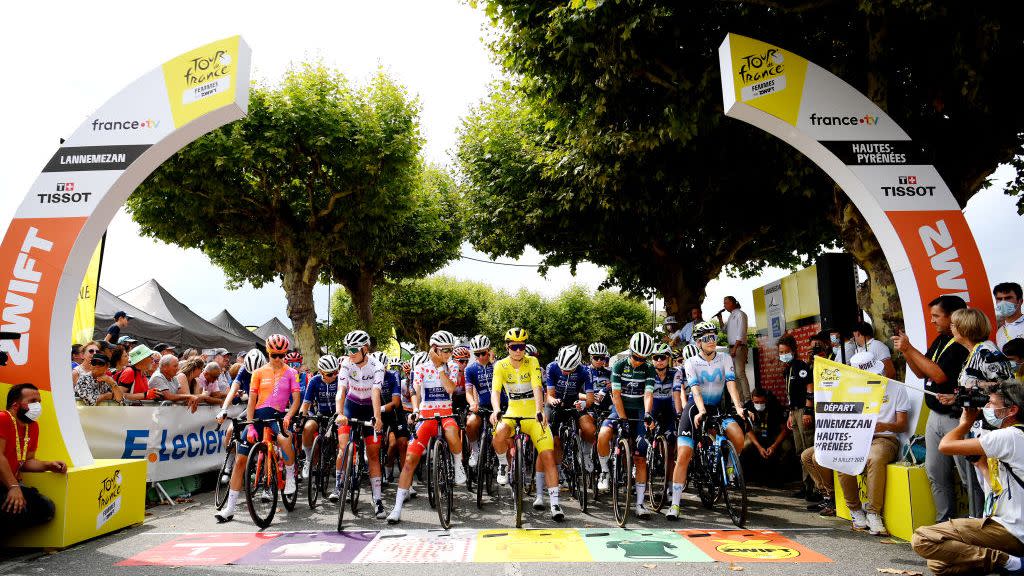2024 Could Be a Make-Or-Break Year for the Tour de France Femmes

If there’s one depressing fact I’ve learned in nearly two decades of covering women’s cycling, it’s that, sadly, there’s rarely a moment to rest on one’s laurels in this sport—and that’s particularly true for race organizers, and team owners.
Just because a race does fantastically well one year in terms of unprecedented levels of viewership and media coverage or because a team is arguably the absolute best in the world doesn’t guarantee anything. It’s all easy come, easy go. That’s why I’m nervous about the Tour de France Femmes avec Zwift and why I believe that this year could be the most pivotal year for the race.
But why am I worried about the Tour de France Femmes in year three? After all, viewership numbers have been high, enthusiasm hasn’t waned, and sports bars are full of fans screaming for Demi Vollering and Kasia Niewiadoma. And yet... There are a few important factors to consider.
Last year, Zwift’s Kate Verroneau told me that the second year of the TDFF was scary for her: The first year, you’re riding a wave of hype. In the second year, the race has to stand as a great race, not just a “first.” What about the third year?
“There’s no kind of resting on the fact that last year was really successful,” Veronneau said then. “I look at it and think, ‘Last year was pretty easy sell: It was the first women’s Tour de France in over 30 years. That was easy to get the media on board, easy to get sponsors on board. It was the first time that that huge of an audience watched women’s racing.”
Year two was hugely successful, but what about year three?
The sponsorship dynamics at play
First, there’s the simple fact that this is year three of Zwift’s four-year commitment to the Tour de France Femmes in partnership with ASO. That means if Zwift isn’t planning to continue its support or is going to cut back its sponsorship budget, this is the year the race needs to look for a new sponsor.
Leaving it entirely to next year, the final year in their contract, is foolhardy. So I have to imagine that there’s some buzz happening behind the scenes already. I haven’t heard any scuttlebutt about them giving up their title sponsorship position, to be clear, but considering Zwift just had a round of layoffs and a shuffle in their C-suite, who knows where they’re heading? Hopefully into another lengthy contract, but it’s unclear. My fingers are crossed.
Viewership challenges
Viewership this year will also be more important than ever. High viewership numbers mean a better chance of securing new or renewed sponsorship dollars, and TdFF viewership has been undeniably impressive. But this year is going to make that tricky. The men’s Tour de France and the Tour de France Femmes are separated this year by the Olympics. That means three weeks between the races, rather than the men’s race ending on the day the women’s race began.
In the past two years, it was easy to just continue tuning in if you’d been watching the men’s race. This year, viewers will have to actively seek it out starting August 12—the day after the Olympics finish. That is a lot of TV watching for cycling/sports fans to contend with. While serious fans will still tune in, those ‘medium’ fans may not.
The state of the cycling industry
Then, there’s the cycling industry landscape. Brands like Trek and Specialized are slashing budgets, and Shimano is reporting quarter after quarter of losses. To blithely assume that there’s a cycling company capable of taking Zwift’s place as title sponsor in the current landscape is a mistake.
I say all this not to be discouraging. It’s meant to be a rallying cry. What does this all mean for you, the person reading this?
I want to believe that this race will survive and thrive in the same way that Le Tour has for over a century. But I also know that it takes more than love to keep a race of this magnitude running. It takes cold, hard cash. It takes commitment from big businesses that often see women’s cycling as a line item that they can scrap when it’s time to tighten up their belts. It took decades to get back to a point where we have this race. It’s happened before, it’s been lost before. Let’s not let it happen again.
It’s time to get fired up and ensure that the Tour de France Femmes isn’t just a blip in the cycling history books. Mark your calendars, set a Google alert for the Tour de France Femmes, follow racers on social media, and plan watch parties—let’s make this the loudest Tour de France Femmes yet.
You Might Also Like

